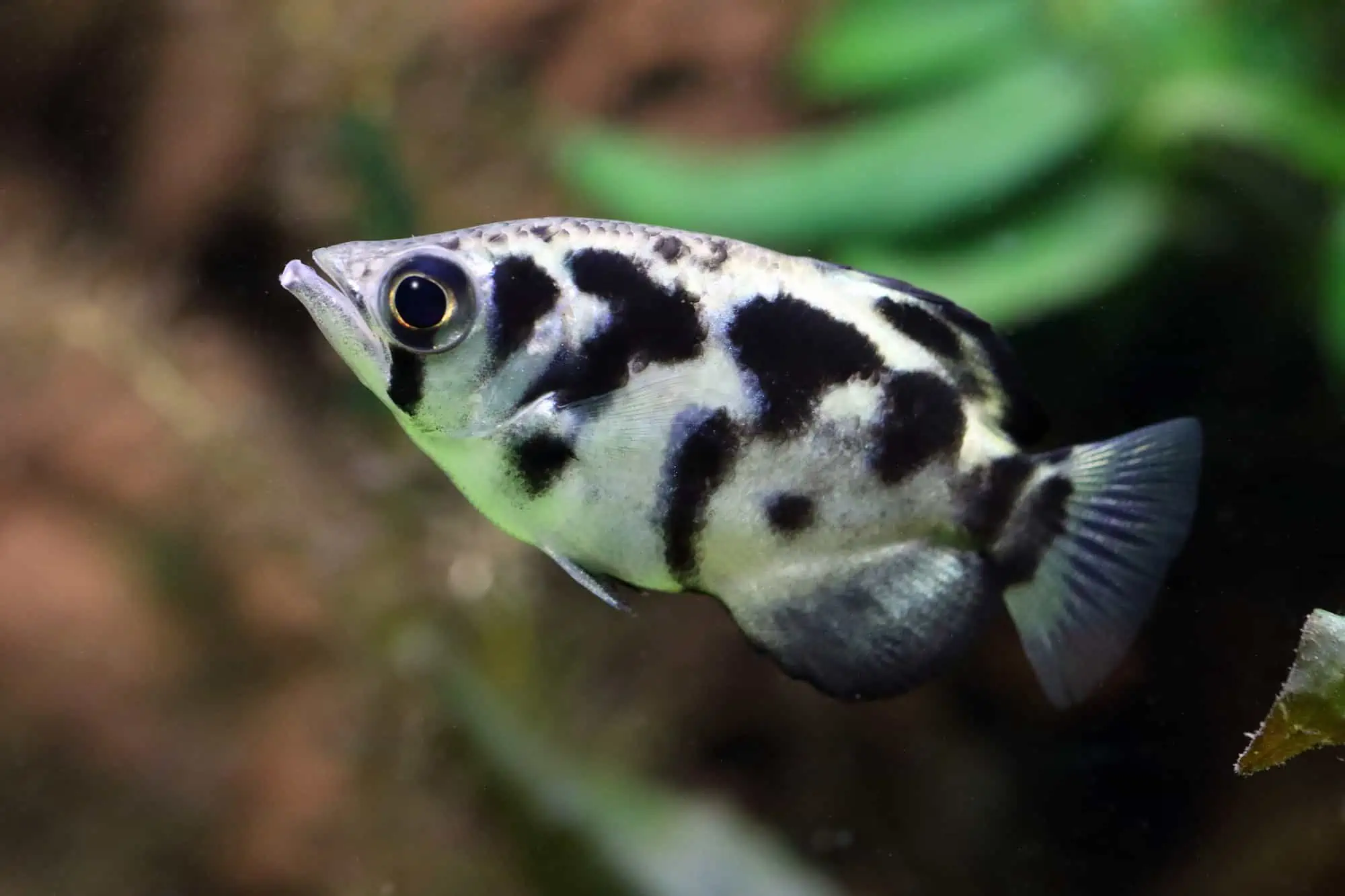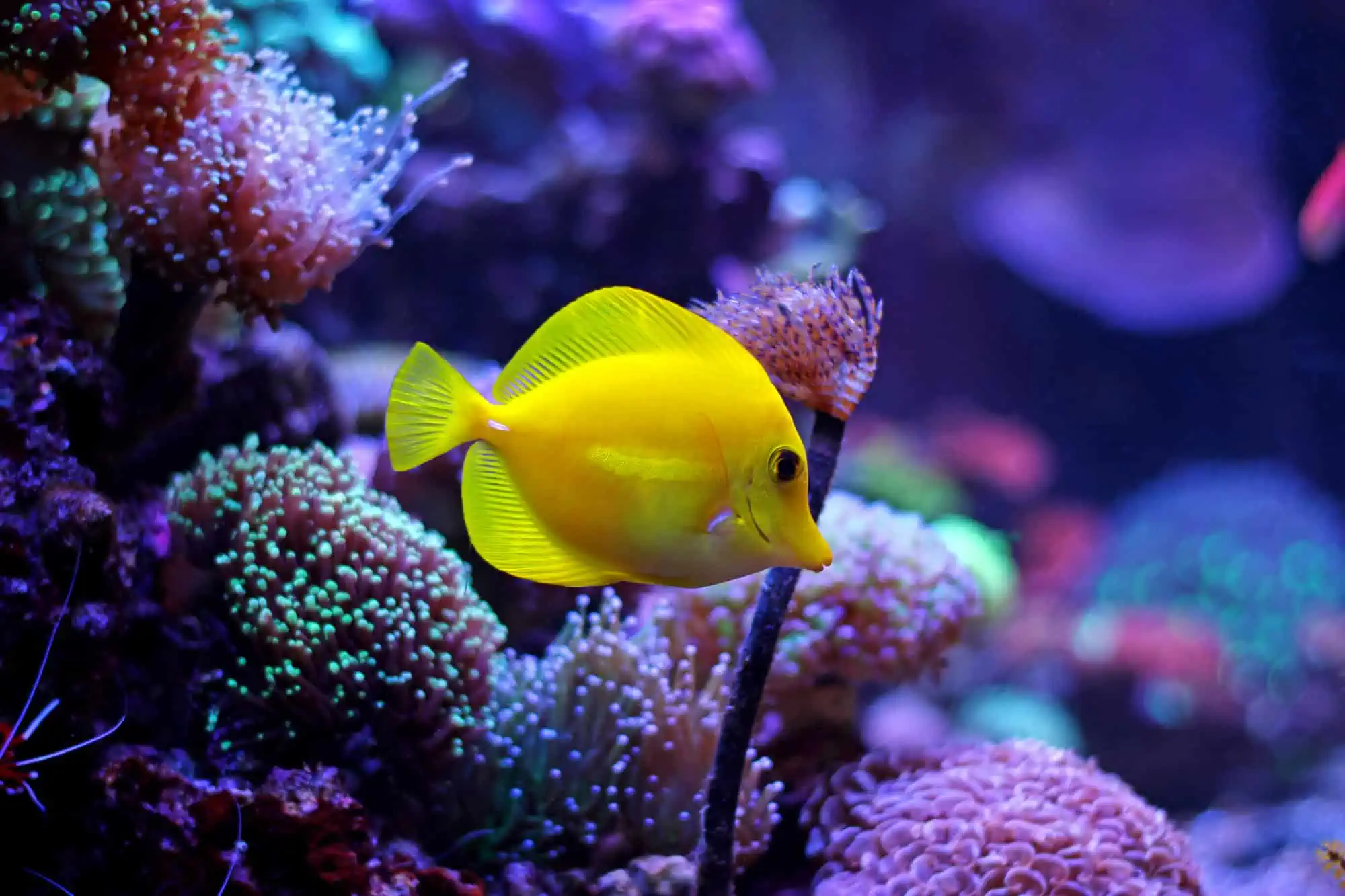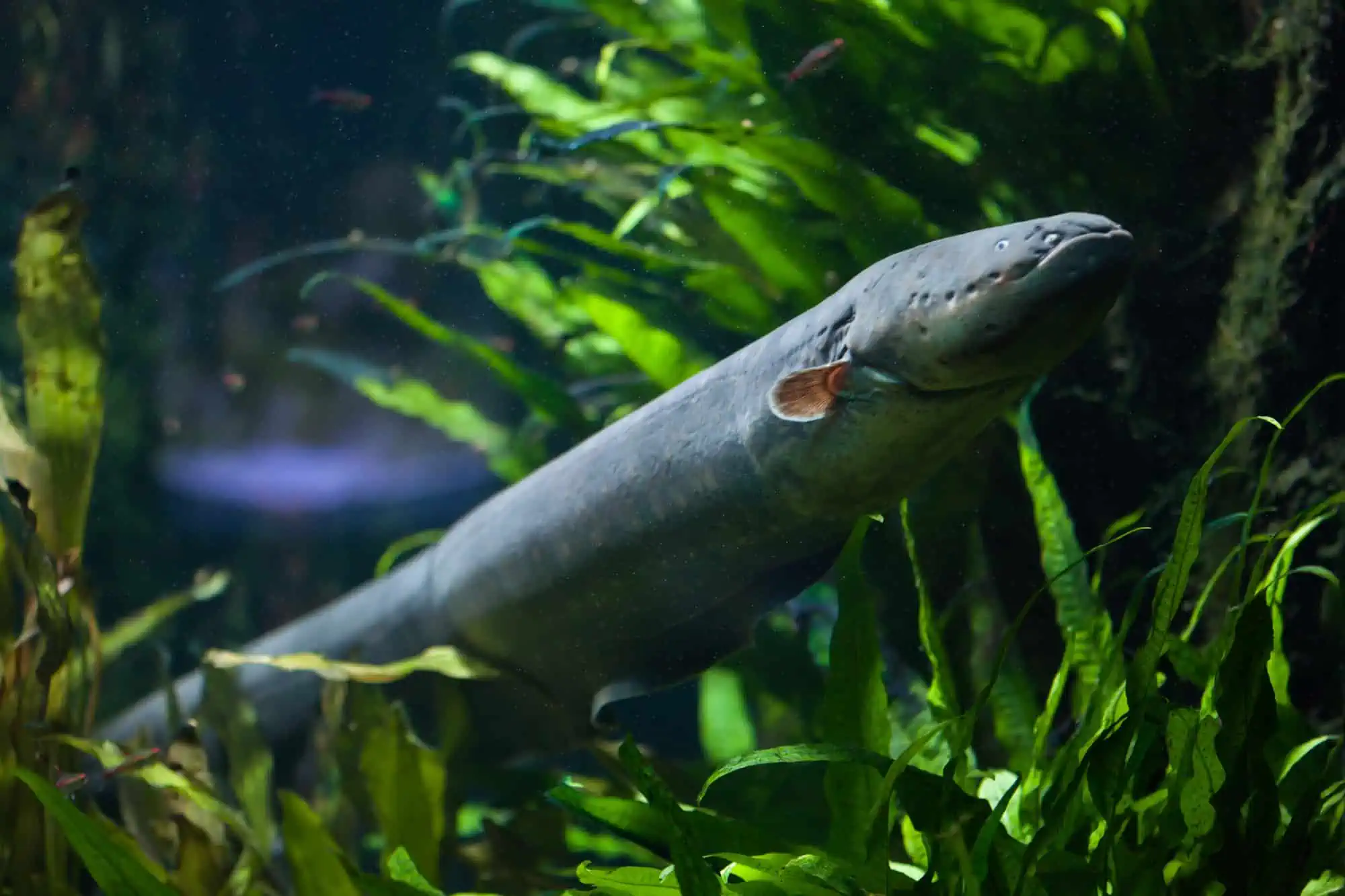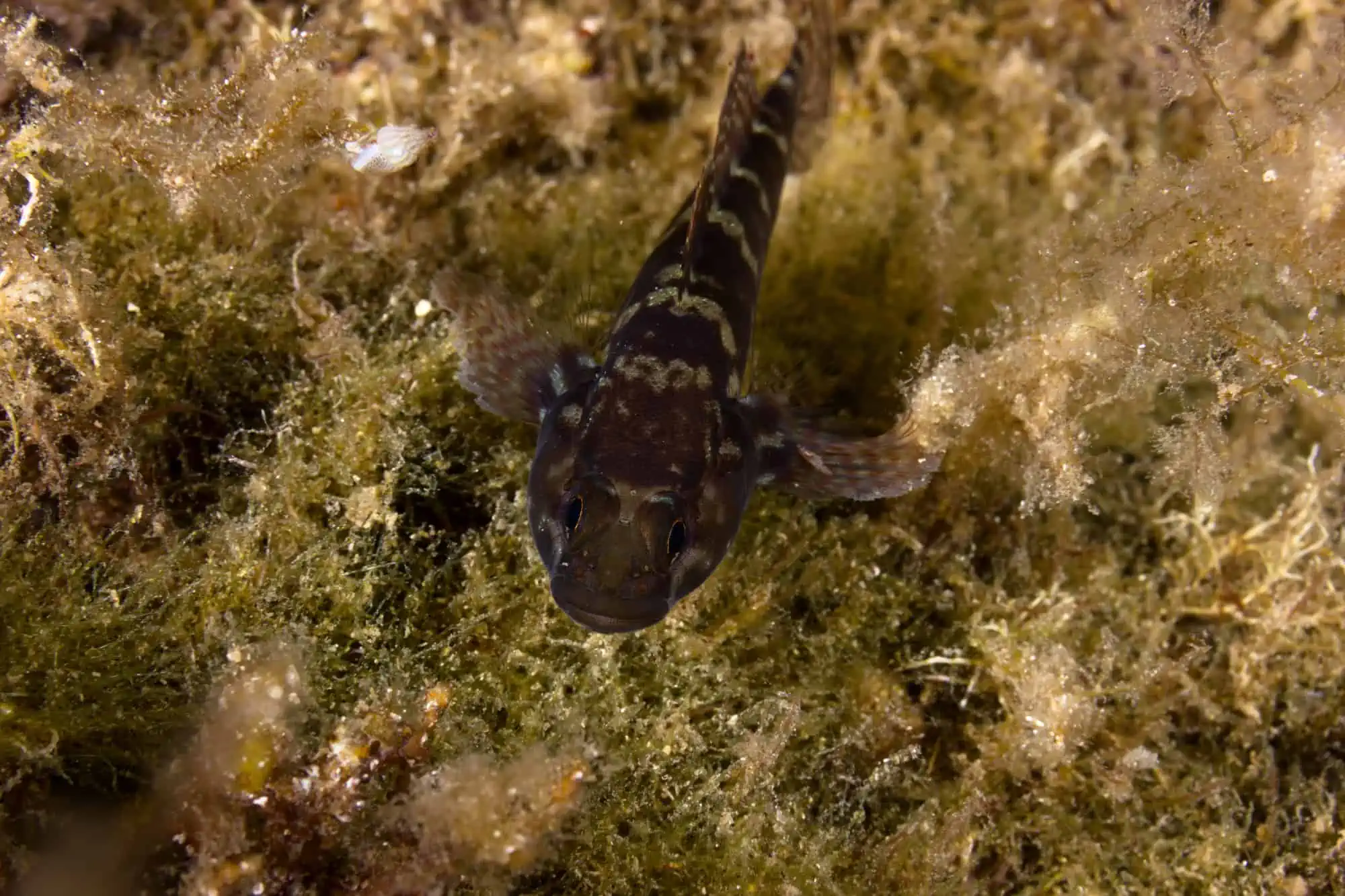[ad_1]
You’ve most likely heard that goldfish have an attention span of just a couple of minutes and probably a memory to match. So, fish can’t be that intelligent, right?
You might be surprised to learn just how intelligent your fishy friends are! Read this guide to discover how fish intelligence is measured, learn how to spot it, and find out if your pet fish are at the top or bottom of the class!
Key Takeaways
- Fish intelligence is often underestimated, but they display a high degree of cognitive complexity, contradicting the myth of their limited memory and attention span.
- Studies have shown that fish can navigate, communicate effectively, remember, use tools, and learn from social cues, with some species of fish surpassing mammals in intelligence tests.
- Despite not having been extensively studied, various fish species have exhibited distinct personalities, and the ability to have fun and can perform tricks, all signs of cognitive sophistication.
How Do We Assess Fish Intelligence?
Intelligence in animals is generally categorized as those with a high degree of cognitive complexity. However, every species is different, and testing that intelligence is notoriously tricky. For example, a test that measures intelligence in a dog or an ape might not apply to fish. That doesn’t mean fish lack the requisite cognitive complexity. The challenge lies in working out what intelligence tests work best for each species.
Some metrics used to evaluate intelligence include mathematical competency, tool use, self-recognition, memory, and social learning.
Recognizing Fish Intelligence
One major challenge in recognizing fish intelligence is that scientific community bias assumes fish are toward the bottom of a linear evolutionary scale than mammals. The closer a species is to humans evolutionarily has long been used as a basis for assuming how intelligent that species is.
Since fish are assumed to be less evolved than mammals, until recently, most people didn’t realize just how intelligent fish are. However, that’s changed in the last decade or so, with fish intelligence studies increasing between 2010 and 2019. Now, it’s known that fish do have a relatively high degree of cognitive complexity, and are, therefore, intelligent.
Are Fish More Intelligent Than Dogs?
It’s difficult to compare intelligence across different species since individual animals have uniquely adapted to their environments and survival tactics. However, researchers discovered that blind Mexican cavefish discovered that the fish could create complex mind maps of their habitat only a few hours after being placed in a new tank.
The fish adapted their behavior to avoid new obstacles that were added to their aquariums, relying purely on memory and apparently learning from experience. So, although it’s difficult to be precise, many fish have performed better or as as as some dog breeds in intelligence tests.
For example, in Pavlovian training in dogs, a stimulus was given to the animals just before food was offered to them. In that experiment, it can take up to 20 trials before the dogs associate the stimulus and the food. Compare that with the reaction in wild rainbow fish who learned the association in just 14 trials!
What’s the Smartest Fish Species?
Manta rays have the largest brains of any fish studied, which could be associated with increased intelligence. African mormyrid fishes also have big brains with extensive complexity, possibly associated with the unique sensory system the fish have evolved.
That said, only a tiny fraction of the 32,000 known fish species have been studied, so it’s tricky to label any individual species as more or less intelligent than another. Nonetheless, fish per se have been noted to have cognitive complexity, meaning that they are considered to be intelligent.
Surprising Facts About Fish Intelligence
Here are some fish behaviors that require cognitive complexity. Does that mean fish are intelligent? What do you think?
Fish Just Wanna Have Fun!
Most hobbyists know that their fish can get stressed and depressed, but did you know your fishy friends can also have fun?
In fact, there are lots of fish behaviors that have no practical purpose other than the creatures just enjoy them!
For example, as you can see in this video, some fish enjoy riding in the bubble stream time and time again, clearly having fun.
Multitasking
Scientists once thought that the ability to multitask was down to having two distinct brain hemispheres or cerebral lateralization, a quality unique in humans. However, it’s since been discovered that some fish species have that quality, allowing them to multitask.
Fish Have Traditions
Fish have been shown to inherit information from older generations, such as fish migration. Interestingly, when the North Atlantic cod fishery collapsed, that was caused by overfishing the older members of the cod shoals, leaving no one to educate the upcoming younger generation.
Masters of Deception
Many fish species are masters of disguise and deception, using mimicry or camouflage to trick predators. Sometimes, an individual fish will engage in deception, whereas on occasion, the foolery takes place in group situations.
A great example of this is demonstrated by Brachyhypopomus gauderio. This species uses weak electric signals to communicate with others of the same species. These signals can indicate the size of the fish. Interestingly, smaller fish have been seen to amplify their electrical signals, making them appear bigger to deceive others.
Using Tools

Using tools is a sophisticated skill that’s generally exclusive to humans and some apes. However, fish can be master manipulators, too, using tools in various ways. For example, some fish can crack mollusks open to get at the nutritious flesh inside the shell.
Archerfish shoot streams of water to knock insects off overhanging branches, using extreme precision to score a direct hit. Not only that, but the water jets match the target’s size, ensuring there’s enough power to unbalance the unfortunate prey and send it tumbling down into the water.
Another amazing demonstration of fish using tools is certain cichlid species and catfish that stick their eggs to small stones and leaves, making it easier to transport them around.
Mental Ability

A study of cleaner wrasses and various primates presented each species with identical food on a blue and red plate. The research team removed the red plate after a short period leaving only the blue one.
Incredibly, only the fish realized that the best way to get the most food was to eat consistently from the red plate and then the blue one. Every single fish worked that out after only 45 trials, while it took two out of four chimps to come to the same conclusion after 60 and 70 repeats of the exercise.
When the same study was carried out using a human child, it took the subject over 100 trials to do what the fish managed!
Navigation
If you’re like me, you’ll struggle to find your way to a new place without a SatNav. However, fish are remarkable natural navigators and can give us a run for our money!
Fish use an amazing array of navigational techniques, including landmarks, magnetic fields, and cognitive maps. Some fish are even able to locate specific landmarks and objects using feature cues, which is something human beings can’t do until they reach at least six years of age.
Social Learning
Social learning is the term used to describe the ability to watch and imitate others within a group. For example, in experiments, untrained Zebrafish learned how to escape from trawl nets, a skill they copied from their more experienced peers.
Communication

Just because fish can’t talk doesn’t mean they can’t communicate and are not intelligent.
Take the electric fish, for example; they have three electroreceptor organs that can spot prey and predators, communicate with each other, and find their way around dark waters via electrolocation.
Fish can also communicate by teeth grinding, vibrating their swim bladders and gill covers, and rubbing their bones together.
Fish Have Memories

Despite what you might think, your fish has an excellent memory. I can vouch for my betta fish, who definitely recognizes me when I offer him a food reward for performing simple tricks.
There are also cleaner fish that know the fish they regularly clean, and that’s potentially up to 100 different fish! Cleaner fish clients can also remember their specific cleaners!
Perhaps most amazing of all are Frillfin gobies. These little fish feed in tidal pools close to the shoreline. When a predator appears, the fish leap to safety in an adjacent pool. So, how do the fish make those accurate leaps? Well, the Frillfins memorize the layout of the tidal pools while swimming around at high tide. Incredibly, the fish can make a mental map of the area after just one pass and remember it over a month later!
Fish Have Personalities
You might not think that fish have much in the way of personalities. After all, your fishy friends spend all day cruising around their aquarium, feeding, rooting through the substrate, and socializing with their tank mates.
However, recent research shows us that fish indeed have unique personalities. Some are confident and sassy, while others are shy and timid. Interestingly, a fish’s personality depends on its genetics and life experiences rather like yours and mine.
Fish Can Learn Tricks

Some fish species can learn simple tricks. That’s not only a great way to show off your pet to visitors but also demonstrates your fish friend’s intelligence.
For example, betta fish can be taught to jump through a hoop, play football, and follow their owner’s finger around the tank for a treat.
Final Thoughts
Fish of all species are surprisingly intelligent animals with amazing cognitive abilities. In various experiments and tests, fish have come out well ahead of mammals, including humans!
Our fishy friends are incredible navigators; they can learn to perform simple tricks, remember their owners and peers, communicate with each other, and even use tools. Fish have traditions handed down through generations and can multitask, too.
So, the next time someone tries to tell you that your pet fish are dopey or stupid, point them to this article and change their minds!
[ad_2]
Source link
